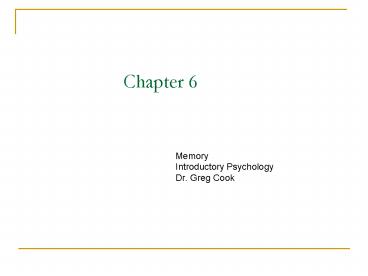Memory PowerPoint PPT Presentation
1 / 14
Title: Memory
1
Chapter 6
- Memory
- Introductory Psychology
- Dr. Greg Cook
2
Memory ModelAtkinson Shiffrin (1968)
Computer as a metaphor for memory and
information processing.
- See Textbook, p. 199.
3
Sensory Memory What a Flash!
- An echo of the input reverberates in our
sensory systems for a very brief time. - Vision Iconic Memory fraction of a second.
- Hearing Echoic Memory up to 2 seconds.
- Capacity is LARGE Duration is VERY BRIEF
- We sense much more than we can possibly process
(funnel effect) - Examples candle tail, film images, feel your
feet - Most of our sensory information is LOST from SM
not encoded to STM
4
Short-Term Memory Paying Attention!
- Current Processing STM holds the information you
are consciously processing (paying attention to)
right now. - Also called Working Memory.
- Capacity Digit Span Test
- Magic number 7 2 pieces of information
(chunks). - Duration 0 18 secs, maybe 30 secs.
- Rehearsal refreshes information, increases
likelihood of transfer to LTM - Maintenance rehearsal (rote)
- Elaborative rehearsal (personalize, connect to
LTM)
5
Long-Term Memory Memory for life!
- Storehouse of facts, events, emotions, images . .
. - Fast Easy vs. Effortful
- Example What is your middle name?
- Duration For life, theoretically. Decay?
- Capacity Unlimited, theoretically.
6
Forgetting Memory failures
- Decay do our memories fade with time?
- Encoding failures (didnt tag it into memory)
- Retrieval failures (cant find it or dig it out)
- Also interference, distortions, consolidation
problems, other phenomenon
7
Recognition versus Recall
- Recognition I know that face!
- Recall What is this persons name?
8
Serial Position Effect Losing the Middle
- If you study a list of words/concepts, then
immediately try to recall them, you get Primacy
and Recency effects. - With delayed recall, you get only the Primacy
effect.
Primacy Effect early items are transferred to
LTM (fresh task) Recency Effect items studied
w/in last seconds are still in STM, if immed
test Intermediate items were not encoded strongly
into LTM, also not now in STM
Image copied from http//en.wikipedia.org/wiki/Ima
geSerial_position.png
9
Context Effects in Memory
- Godden Baddeley (1975) studied people in a
diving club. Textbook, p. 205. - Learned list of words 10 ft underwater vs. on
land - Tested 10 ft underwater vs. on land
- Memory scores were 47 higher when testing
context matched learning context. Place cues. - Where do you study? Where do you take tests?
10
Other Memory Phenomena
- Infantile amnesia
- Flashbulb memories dramatic events
- Repressed memories traumatic events
- Motivated forgetting protecting yourself
- suppression vs. repression
11
Ebbinghaus Famous Forgetting Curve
Hermann Ebbinghaus (1850-1909) conducted the
first systematic studies of human memory. Using
himself as a subject, he learned nonsense
syllables, then tested his memory after delays up
to 31 days. Most forgetting occurs rapidly,
then what sticks tends to stick long term.
LEJ, XIZ, LUK, ZOH, . . .
- Images from http//encarta.msn.com/media_461547609
_761578303_-1_1/Forgetting_Curve.html
12
- How much do you remember from your high school
courses? College? - Try this link
- http//lazowska.cs.washington.edu/scienceforum/tsl
d085.htm
13
Improving Your Memory
- Organization create meaningful clusters
- Overlearning take it over the top
- Spaced practice better than massed practice
- Recitation practice retrieving information
- (use recall go beyond recognition)
14
- I hope you remember all of this!!

